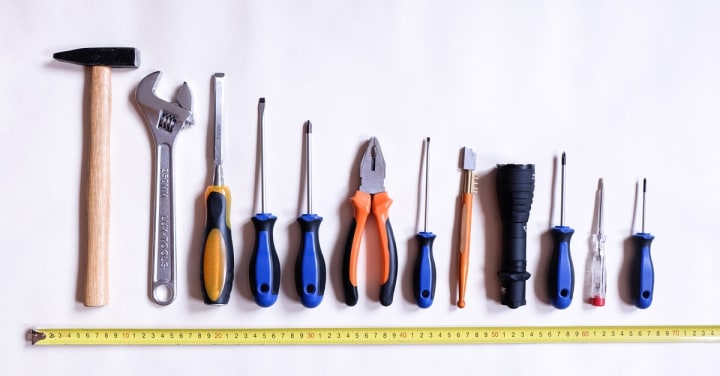Resumes Don’t Have Right Answers
Spend less time fretting about your resume, and more time re-thinking it.

Have you been dragging the same old Word file around from hard drive to hard drive for years, shuffling it between inboxes and desktops and Google Drive folders, over and over again? Making hasty last-minute additions to a tired-looking document whenever, God forbid, for some reason, you need to send your resume off somewhere? And every time, you think to yourself, “I really need to update my resume…”
But it’s just one of those things, isn’t it? The kind of thing you always mean to "get around to," but never seem to make time? Maybe you figure your current resume feels like it’s good enough—after all, it might not be perfect and fancy, but it’s gotten you this far. Or maybe, whether you’ve thought about it this way or not, the reason you’re perpetually procrastinating a resume refresh is because you aren’t even sure how to go about it. And that possibility is, I think, precisely part of the problem: We haven’t necessarily learned to think about our resume in helpful ways.
In this post, I’m going to try to offer some new perspectives on what a resume actually is, how we develop our resume habits, and how you might go about making yours better.
Your resume is your main tool for getting a job.
You could have killer interview skills, but no hiring manager will ever find out if your resume doesn’t get them to pick up their phone and give you a call. In fact: You could be the most amazing, uber-qualified, stellar-potential applicant Payless Shoe Source has ever had. But if you can’t spell it out for them on your resume, you might never even make it past the first stumbling block en route to building your own affordable shoe empire (or, ya know, whatever else it is you aspire to from your career beginnings at Payless).
No matter what you want to do or how you want to get there, it all starts with learning to create a resume that gets employers to call you. And it is, indeed, a skill that can be learned. Some of us happen to be born with natural talents that give us a knack for selling ourselves on paper, just like some of us happen to be born with natural talents that give us the ability to dunk a basketball. But every one of us is capable of learning to create a better resume for ourselves.
Your resume is your main tool for getting a job, and today your resume has more competition than ever. Luckily, you also have access to more tools and resources than ever to create that resume that shows you off to potential employers in the best possible way. These days, anyone can create a beautiful, professional-looking resume online for free. And what that really means? Is that having a solid resume strategy has become more important than ever.

Photo via Pxhere
Most of us learn to create a resume in school—or not at all.
When did you first learn to create a resume? You may have had a parent or relative who helped you create your first resume, or maybe you were part of an extracurricular group where you had some resume help. But, most likely, a lot of your initial knowledge of and thoughts about resumes came from school. Whether it was in English or some sort of career preparation class, if you’re a millennial who grew up in Canada there’s a good chance you were once graded on your resume.
I get the idea behind this, I do. However I think it may have also—unintentionally, but implicitly—given off the impression that resumes have "right answers" and "wrong answers." They do not. I have created dozens of resumes since the early 2000s, and I still create a fresh one for every new opportunity that requires a resume. And let me tell you, there are resumes that have gotten me hired on the spot for certain jobs that wouldn’t even result in a second look if I used them for other jobs.
Checking the grammar, tweaking the style, and rearranging the sections—that’s all gravy. And, like gravy, it’s very important. But when you’re creating a resume, your first and main focus needs to be deciding strategically on its content. What experiences, roles, and achievements will you showcase for this resume? Which points will you choose to highlight, and where can you incorporate language from the job posting? How will you organize your skills, strengths, and background so that everything on that page points to you being the best person for the job? When we stop worrying about "getting it right," we have a better shot at actually showing how we’re the right fit.

Photo via Pxhere
Job applications are different from schoolwork (but you still need to do your homework).
When a teacher gives their class an assignment to create a resume, it’s not a great simulation for creating a resume for an actual job posting. Despite the whole class creating a resume at the same time, each person is completing an individual assignment and being given a grade based on whether or not they do what’s asked of them. When you submit a resume to a job posting, you aren’t being individually graded. You’re competing. When there’s only one job opening, there’s no scenario where every job applicant scores 100 percent and they all get hired: There’s only one passing grade up for grabs.
That doesn’t mean there’s a specific resume that is "right" for the job; for any given job, there are tons of ways to submit a resume that will spark an employer’s interest. It means you can’t only go through the motions of creating a resume and hope it’s good enough. In high school, you didn’t have to worry about your grades suffering just because someone else was putting in more effort. But when you’re applying for a job, they’re either going to hire you or they’re going to hire someone else. Effort counts for a lot.
So even though applying for a job works differently than writing an essay for English class, you get a better result in both cases when you do your homework. For essays, that means reading the material closely, doing quality research, writing an outline, drafting, editing, and polishing a final product. For resumes, it means reading the job posting closely, doing research on the company and its goals, outlining how your strengths make you suitable for the job, then drafting, editing, and polishing a final product.

Photo via Pxhere
Practice Makes Perfect
It’s a relief when you realize that employers don't have an answer sheet or a rubric, that they're not grading your resume or looking for it to have the 100 percent "correct" components. Instead, what employers really want from your resume is simply a clear, honest picture of who you are, what you can do, and why you want to work for them.
But, like most worthwhile things in life: It’s a skill that takes trial, error, and good old practice. There are no "right answers" when it comes to resumes, but there are things you can do right. So when you see an opportunity that piques your interest, put together a resume and send it in. Whether you think you have a chance or not, whether you're ready for it or not, whether you know for sure if you'll accept it or not... apply.
Because it’s only through the practice of pushing yourself to apply for different things that you’ll be ready when the "right" thing does come along.
About the Creator
Meag Campbell
An Atlantic Canadian millennial who's been having a never-ending identity crisis since 2009.






Comments
There are no comments for this story
Be the first to respond and start the conversation.